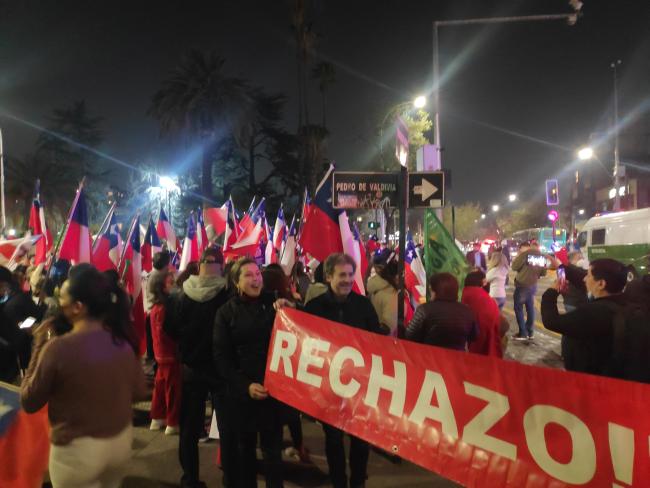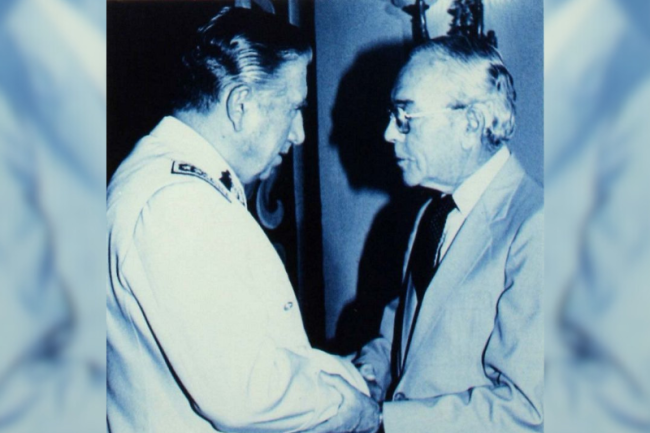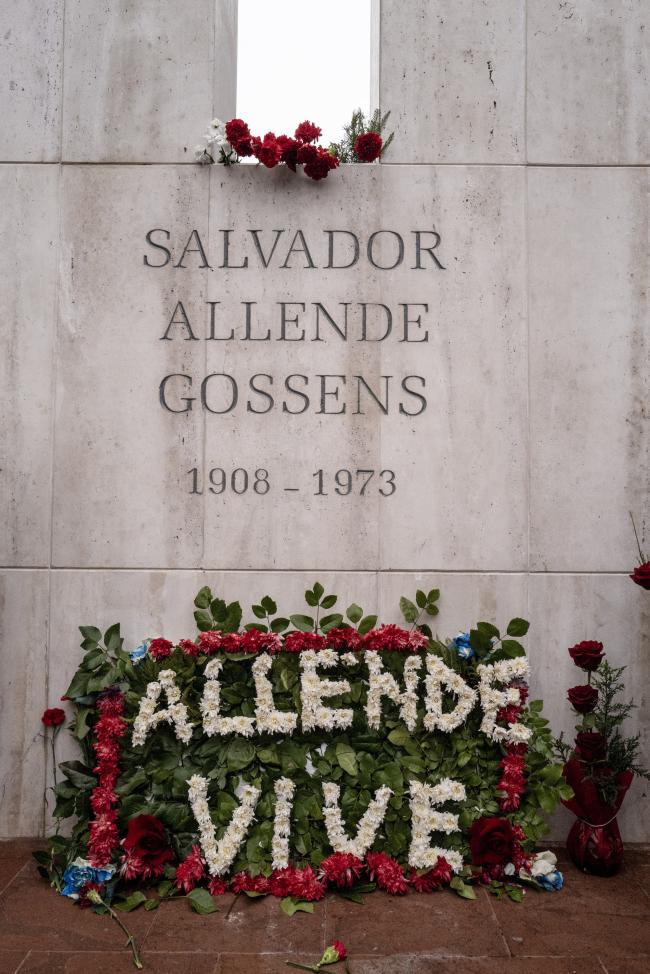
On December 17, Chileans rejected another proposed constitution. Drafted by a group of elected representatives dominated by the right and far right, the conservative document was defeated by about 55 percent to 44 percent; the “no” vote came out on top in all but three regions. Analysts had expected the proposal to fail, though on the eve of the vote, polls showed that margin narrowing.
If it had been approved, the draft would have replaced Chile’s current dictatorship-era constitution. As it stands, that document will not only remain in place—it will likely remain for years to come. The government of President Gabriel Boric, which came to power on the momentum of protests that demanded a new charter, has said it will not attempt a third process before its term ends in March 2026.
Under different circumstances, the outcome may have been a major victory for the left. The proposal would have restricted abortion access, further enshrined neoliberal economics, and laid the groundwork for dozens of people imprisoned for dictatorship-era crimes to be released on house arrest. But the alternative—the endurance of the 1980 Constitution—has for many opponents quelled the urge to celebrate.
“Relief, that was the first thing I felt and conveyed last night. We saved ourselves,” wrote lawyer and anthropologist Antonia Rivas Palma on X, “from a conservative constitution which made us go backwards in our rights. We’re saved. We didn’t win anything, but sometimes, not losing and resisting is a huge gain.”
The road towards replacing the constitution kicked off in 2019, when protests against an increase in subway fares quickly erupted into mass outrage over the inequality driven by Pinochet’s neoliberal legacy and the political class that maintained it. The pressure forced the establishment to launch a constitutional process.
Written in 1980 under the military regime of General Augusto Pinochet and reformed dozens of times since then, the current constitution was approved outside of the democratic process. Its architect, Pinochet advisor Jaime Guzman, began to lay the groundwork for a magna carta just days after the 1973 U.S.-backed coup that brought the dictatorship to power. The charter enshrines Chile’s neoliberal economic model, and among other issues, does not recognize the existence of Indigenous peoples.

The mandatory plebiscite on December 17 was the second attempt to replace the constitution in a little more than a year. Last September, 62 percent of voters rejected the first proposal, drafted by a progressive, democratically elected Constitutional Convention. That proposal would have expanded rights protections for women, Indigenous nations, and the environment. It was also the target of a massive right-wing disinformation campaign. Those efforts relied heavily on false claims—including that if approved, the document would allow indigenous communities to secede from Chile and eliminate private property or allow the government to seize people’s homes.
In the days since the vote, left and right have scrambled to claim the result as a victory. The dialogue has hinged on what the constitutional process says about Pinochet’s legacy.
“Chile did not want the constitution of Pinochet,” wrote academic Rodolfo Matus in a post on X, referencing the October 2020 referendum in which 78 percent voted to replace the current charter. And now, Matus wrote, voters had also rejected the proposed constitution “of his heirs.”
The far-right Republicano Party, which is led by former presidential candidate José Antonio Kast and includes many Pinochetistas, not only led the second process—it held veto power. The party originally did not want to replace the constitution. But Kast—whose brother Miguel was a Chicago Boy and whose father was a former Nazi who died under investigation for the 1973 murders of dozens of peasants in the rural community of Paine—shifted gears when it became clear that the Republicanos had the opportunity to craft a more conservative document.

Still, in some ways, the result is being framed as evidence Chileans support the current charter, including by the right. A column on the news site El Librero called the outcome proof of the “unquestionable democratic legitimization” of Pinochet’s constitution.
Writing in El País, Chilean journalist Rocio Montes notes, “Chileans are more concerned about other issues that cannot be fixed with a new constitution.” That includes growing crime, she writes, driven by an uncertain economic future. “The economy has remained stagnant for more than a decade; the public education crisis, which started to become evident during the 2016 protests [against the private pension system], persists, while the private health system faces serious problems that could take a heavy toll on the public system.”
In a column for the right-leaning El Mercurio, businessman and economist Nicolás Ibáñez Scott called the constitutional process “a trap” that Chile fell into while seeking a way out of the “political extortion” represented by the 2019 uprising.
Ibáñez has in the past expressed his “enormous gratitude” for Pinochet. But many across the political spectrum share the view that opening the door to the constitutional process was an effort by the political class to appease 2019’s massive protests, known as the estallido social.
Contending with the Far-Right, 50 Years Since the Coup
Over the past year, Chile has reckoned with stark reminders of the Pinochet era. This final constitutional process took place as the nation marked 50 years on September 11 since the military overthrew President Salvador Allende. Beyond the far-right capture of the constitutional process, growing ultra-conservative power has also emboldened denialist views on the dictatorship, which disappeared more than 3,000 and imprisoned tens of thousands more.

Also during the final steps of the constitutional process, one of the killers of popular folk singer Victor Jara was extradited from the United States to Chile after a years-long effort by his widow, Joan Jara. In November, Joan died. She was a respected figure in the struggle against impunity for Pinochet’s collaborators, and hundreds of people attended her Santiago funeral.
Less than three weeks after Joan's death, former U.S. diplomat and accused war criminal Henry Kissinger died aged 100, in complete impunity. Over the years, U.S. declassified documents from the Pinochet era have revealed Kissinger as the primary architect of Washington’s efforts to destabilize Chile and prime it for a coup, starting from Allende’s 1970 election.
Under the weight of such history, it seems Chile is now in the same position it was in 2019, before the promise of a new constitution.
But many analysts viewed the vote on the second draft as a referendum on Chile’s growing far-right Republicanos. One member of the Council of Experts appointed by Congress to prepare the second draft constitution told El País earlier this year that Kast’s party “has realised that, if it wants to govern, it must have the constitutional issue resolved.” Put another way, while disparate right-wing elements claim the referendum vindicates the Pinochet charter, the result also represents a failure of the far-right Republicanos to consolidate their power.
A victory in the referendum may well have propelled Kast to the presidency in the 2025 elections. Though it remains unclear what a loss will mean for the Republicanos’ prospects, Chile rejected their vision for the constitution.
On the day of the plebiscite, sociologist Eugenio Tironi wrote in La Tercera, that, in the event of a “no” vote against the second draft constitution, “the traditional right should say, okay, let's get rid of our Trump.” Some analysts argue Kast will lose ground while others say he’s been knocked out of the presidential race entirely.
Nyki Duda is a Chicago-based writer, editor, and researcher.

